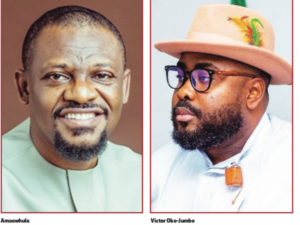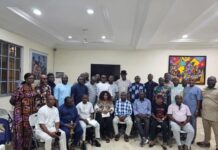In a landmark decision that has sent ripples through the corridors of power in Rivers State, the Nigerian Supreme Court has dismissed Governor Siminalayi Fubara’s appeal against the Court of Appeal’s affirmation of Hon. Martin Amaewhule as the authentic Speaker of the Rivers State Assembly.
The ruling not only reinforces the legitimacy of the Amaewhule-led lawmakers but also highlights a turbulent saga of executive overreach, constitutional missteps, and factional infighting that has marred the state’s political landscape.

Background: The Battle for Assembly Legitimacy
The genesis of the current impasse can be traced to a bitter power struggle within the Rivers State Assembly. The assembly has long been fraught with division, exacerbated by a fraught relationship between Governor Fubara and his predecessor, Nyesom Wike, whose lingering influence continues to purportedly polarise state politics.

At the heart of the dispute lies a contentious decision by Governor Fubara to present the 2024 Rivers State Appropriation Bill to only a select few lawmakers—specifically, the four members loyal to the faction led by Hon. Edison Ehie.
This faction had, in a dramatic move, declared the pro-Wike Amaewhule-led 26 members’ seats vacant following their purported defection from the Peoples Democratic Party (PDP) to the All Progressives Congress (APC).
The ensuing legal battles have seen multiple courts weigh in. The Federal High Court’s decision on January 22, 2024, nullified the controversial state budget on the grounds that it was not presented to a constitutionally recognised assembly.
This was followed by an Appeal Court ruling on October 10, 2024, which unequivocally validated the authenticity of the Amaewhule-led members. Governor Fubara’s subsequent appeal, however, was met with a judicial rebuke that has now been confirmed by the Supreme Court.
The Supreme Court Ruling: Legal Reasoning and Constitutional Imperatives
On Monday, a five-member panel of the apex court, led by Justice Uwani Abba-Aji, delivered a decisive blow to Governor Fubara’s legal manoeuvres. The case, cited as SC/CV/1071/2024, saw the governor’s appeal withdrawn by his own legal team—an act that has been widely interpreted as an acknowledgment of the mounting evidence against his administration’s actions.
Key Elements of the Judgment
Withdrawal of Appeal: When the matter was brought before the court, Governor Fubara’s counsel, headed by Mr Yusuf Ali, SAN, announced that the appeal was being withdrawn. This withdrawal was attributed to the fact that the situation had “been overtaken by events,” suggesting that further contestation was both legally and politically untenable.
Cost Implications: Despite the withdrawal, the court did not simply dismiss the matter without consequences. Chief Wole Olanipekun, SAN—representing the Amaewhule-led Rivers State lawmakers—successfully argued for the imposition of costs. The apex court subsequently awarded a total of N4 million in costs against Governor Fubara, underscoring the judicial displeasure with his actions.
Validation of the Amaewhule-led Assembly: The Supreme Court’s decision further cements the appellate court’s earlier ruling that the Amaewhule-led lawmakers are the bona fide members of the Rivers State Assembly. By doing so, the court has effectively delegitimised the faction that had supported Governor Fubara’s unilateral approach.
Constitutional Violations and Executive Recklessness
The apex court’s judgment is rife with pointed criticism of Governor Fubara’s handling of state affairs. Among the most damning findings was the assertion that presenting the appropriation bill to only four of the 31 members of the Assembly constituted a blatant violation of section 91 of the 1999 Constitution, as amended. The court labelled this action as “executive recklessness,” an indictment that carries significant political and legal weight.
Moreover, the decision criticised the governor’s interference in the administrative operations of the Assembly. The redeployment of the clerk and deputy clerk—an act described as a direct contravention of constitutional mandates—exemplified the broader pattern of overreach that has defined Fubara’s tenure.
Justice Omotosho’s remarks on the matter stressed that such actions not only undermine the legislative process but also threaten the delicate balance of power enshrined in Nigeria’s constitutional framework.
In-Depth Analysis: The Fallout for Rivers State and Nigerian Politics
Political Fragmentation and Factionalism
At the core of the current crisis is a deep-seated factionalism that has long beleaguered Rivers State politics. The bitter rivalry between Governor Fubara and the Nyesom Wike has created a climate of distrust and disunity within the state’s political class. The decision to sideline the pro-Wike Amaewhule-led lawmakers in favour of a small, loyalist faction has not only sown confusion but also eroded the democratic legitimacy of the state’s legislative processes.
Political analysts suggest that Fubara’s manoeuvre was an attempt to consolidate power amid internal dissent. However, the Supreme Court’s ruling, by affirming the authenticity of the Amaewhule-led Assembly, has effectively nullified any claims to unilateral executive authority.
This outcome is a stern reminder that in Nigeria’s constitutional democracy, the separation of powers is sacrosanct—a principle that cannot be subverted by political expediency.
The Implications of Judicial Intervention
The intervention by Nigeria’s highest court serves as a powerful affirmation of the judiciary’s role as a bulwark against executive overreach. By dismissing the appeal and imposing significant costs on Governor Fubara, the court has sent a clear message to all political actors: adherence to constitutional processes is not optional.
This decision is likely to have far-reaching consequences, potentially deterring future attempts by any government to bypass the democratic mechanisms enshrined in the constitution.
Legal experts have argued that the Supreme Court’s stance underscores the importance of maintaining judicial independence in a political landscape often characterised by patronage and power plays.
The ruling not only rectifies past missteps but also establishes a precedent that could help stabilise legislative operations in states where similar disputes are likely to emerge.
Economic and Administrative Ramifications
Beyond the immediate political fallout, the judgment carries significant economic and administrative implications. The nullification of the 2024 state budget—originally presented under a cloud of controversy—raises serious concerns about the management of public funds in Rivers State.
The appropriation bill, which had been pushed through under dubious circumstances, is now mired in legal and constitutional challenges that could delay essential fiscal policies and public expenditure.
Governor Fubara’s decision to present the budget to a restricted number of lawmakers not only violated constitutional provisions but also risked compromising the transparency and accountability that should characterise state financial management.
The court’s intervention, by mandating the release of funds and restoring the legitimacy of the Amaewhule-led Assembly, seeks to rectify these administrative anomalies. However, the long-term impact on public trust and fiscal discipline remains uncertain.
The Road Ahead: Prospects for Reconciliation and Reform
The Supreme Court’s ruling, while decisive, is unlikely to mark the end of political turbulence in Rivers State. The deep-seated divisions within the state’s political elite suggest that reconciliation will be a long and arduous process.
For Governor Fubara, the judgment represents a substantial setback—a self-inflicted wound that not only undermines his authority but also invites scrutiny from both political rivals and the electorate.
Recommendations for Political Stability
Inclusive Governance: There is a pressing need for a more inclusive approach to governance in Rivers State. The current model, which has fostered factionalism and discord, must be replaced with a system that recognises and integrates diverse political voices.
Strengthening Institutional Checks: The role of the judiciary in upholding constitutional norms must be further reinforced. Ensuring that all branches of government operate within their constitutional mandates is crucial to maintaining political stability and public confidence.
Transparent Fiscal Management: The controversy surrounding the 2024 budget underscores the importance of transparency in financial administration. Future fiscal policies should be developed through a consultative process that involves all legitimate members of the legislative assembly.
Dialogue and Reconciliation: To heal the deep political rifts, there must be concerted efforts to initiate dialogue among the various factions. Such efforts could pave the way for a more harmonious political environment and mitigate the risk of further constitutional crises.
Conclusion
The dismissal of Governor Fubara’s appeal by the Supreme Court is more than just a legal victory for the Amaewhule-led lawmakers—it is a clarion call for accountability, transparency, and adherence to constitutional norms in Rivers State.
The judgment, characterised by its incisive critique of executive overreach and factional manipulation, sets a robust precedent that could reshape the political landscape not only in Rivers State but across Nigeria.
As the state grapples with the aftermath of this decision, the long-term challenge will be to rebuild trust in the democratic process.
The road to reconciliation may be fraught with obstacles, but the unwavering commitment to constitutional principles demonstrated by the judiciary offers a glimmer of hope for a more stable and accountable political future in Nigeria.











